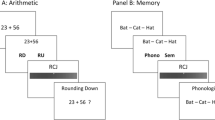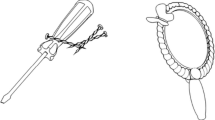Abstract
The training experiment with 30 mentally handicapped children tested two models of mental-arithmetic development. Contrary to an associative learning model and consistent with a schema model, children's initial responses to a mental-addition task appear to be the product of a mechanical prescription, such as simply stating one of the addends. The evolution of mental-addition errors was not linked to practicing incorrect answers; mental-addition errors appear to be more an error of method than an error of recall. Moreover, experimental subjects mastered both practiced and unpracticed combinations involving zero and one, which indicates that they learned relationships, not specific associations:
Similar content being viewed by others
References
AndersonJ. R.: 1982, ‘Acquisition of cognitive skill’, Psychological Review 89, 369–406.
AndersonJ. R.: 1983, The Architecture of Cognition, Harvard University, Cambridge, MA.
AndersonR. C.: 1984, ‘Some reflections on the acquisition of knowledge’, Educational Researcher 13(9), 5–10.
Ashcraft, M. H.: 1985, April, Toward a Model of Retrieval and Probem Solving, Paper presented at the biennial meeting of the Society for Research in Child Development, Toronto.
AshcraftM. H.: 1987, ‘Children's knowledge of simple arithmetic: A developmental model and simulation’, in J.Bisanz, C. J.Brainerd, and R.Kail (eds.), Formal Methods in Developmental Psychology, pp. 302–338, Springer-Verlag, New York.
BaroodyA. J.: 1985, ‘Mastery of the basic number combinations: Internalization of relationships of facts?’, Journal for Research in Mathematics Education, 16, 83–98.
BaroodyA. J.: 1987, Children's Mathematical Thinking: A Developmental Framework for Preschool, Primary, and Special Education Teachers, Teachers College, New York.
Baroody, A. J.: in press-a, A Guide to Teaching Basic Mathematics in the Primary Grades, Allyn and Bacon, Boston.
Baroody, A. J.: in press-b, ‘Kindergarteners' responses to simple addition combinations’, Journal for Research in Mathematics Education.
BaroodyA. J. and H. P.Ginsburg: 1986, ‘The relationship between initial meaningful and mechanical knowledge of arithmetic’, in J.Hiebert (ed.), Conceptual and Procedural Knowledge: The Case of Mathematics, pp. 75–112, Erlbaum, Hillsdale, NJ.
Beilin, H.: 1981, Piaget and the New Functionalism, Paper presented at the Eleventh Symposium of the Jean Piaget Society, Philadelphia.
BrownellW. A.: 1935, ‘Psychological considerations in the learning and the teaching of arithmetic’, in The Teaching of Arithmetic (10th Yearbook of the National Council of Teachers of Mathematics, pp. 1–31). Bureau of Publications, Teachers College, Columbia University, New York.
BurtonT. A.: 1974, ‘Education for Trainables: An impossible dream?’ Mental Retardation 12, 46.
CampbellD. T. and J. C.Stanley: 1966, Experimental and Quasi-Experimental Designs for Research, Rand McNally, Skokie, IL.
CarpenterT. P.: 1985, ‘Research on the role of structure in thinking’, Arithmetic Teacher 32(6), 58–60.
CornwallA. C.: 1974, ‘Development of language, abstraction and numerical concept formation in Down's syndrome children’, American Journal of Mental Deficiency 79, 179–190.
CruickshankW. M.: 1948, ‘Arithmetic work habits of mentally retarded boys’, American Journal of Mental Deficiency 52, 318–330.
FusonK. C., J.Richards, and D. J.Briars: 1982, ‘The acquisition and elaboration of the number word sequence’, in C. J.Brainerd (ed.), Children's Logical and Mathematical Cognition, pp. 33–92, Springer-Verlag, New York.
GinsburgH. P.: 1982, Children's Arithmetic, Pro Ed., Austin, TX.
HgF and L. B.Ames: 1951, ‘Developmental trends in arithmetic’, The Journal of Genetic Psychology 79, 3–28.
NeisserU.: 1976, ‘General, academic, and artificial intelligence’, in L. B.Resnick (ed.), The Nature of Intelligence, pp. 135–144, Erlbaum, Hillsdale, NJ.
NesherP.: 1986, ‘Learning mathematics: A cognitive perspective’, American Psychologist 41, 1114–1122.
OlanderH. T.: 1931, ‘Transfer of learning in simple addition and subtraction’, 2, Elementary School Journal 31, 427–437.
Rabinowitz, M.: 1985, April, A Representation of Simple Addition Knowledge and Related Processing Characteristics, Paper presented at the biennial meeting of the Society for Research in Child Development, Toronto.
ResnickL. B.: 1983, ‘A developmental theory of numbers understanding’, in H. P.Ginsburg (ed.), The Development of Mathematical Thinking, pp. 109–151, Academic, New York.
ResnickL. B. and W. W.Ford: 1981, The Psychology of Mathematics for Instruction, Erlbaum, Hillsdale, NJ.
SieglerR. S. and M.Robinson: 1982, ‘The development of numerical understandings’, in H. W.Reese and L. P.Lipsett (eds.), Advances in Child Development and Behavior, Vol. I, pp. 241–312, Academic, New York.
SieglerR. S. and J.Shrager: 1984, ‘Strategy choices in addition: How do children know what to do?’, in C.Sophian (ed.), Origins of Cognitive Skills, pp. 229–293, Erlbaum, Hillsdale, NJ.
StarkeyP. and R.Gelman: 1982, ‘The development of addition and subtraction abilities prior to formal schooling in arithmetic’, in T. P.Carpenter, J. M.Moser, and T. A.Romberg (eds.), Addition and Subtraction: A Cognitive Perspective, pp. 99–116, Erlbaum, Hillsdale, NJ.
SuydamM. N. and J. F.Weaver: 1975, ‘Research on mathematics learning’, in J. N.Payne (ed.), Mathematics Learning in Early Childhood (37th yearbook of the National Council of Teachers of Mathematics, pp. 44–67), National Council of Teachers of Mathematics, Reston, VA.
ThieleC.: 1938, The Contribution of Generalization to the Learning of the Addition Facts, Bureau of Publications, Teachers College, Columbia University, New York.
ThorndikeE. L.: 1922, The Psychology of Arithmetic, Macmillan, New York.
WeaverJ. F.: 1982, ‘Interpretation of number operations and symbolic representations of addition and subtractions’, in T. P.Carpenter, J. M.Moser, and T. A.Romberg (eds.), Addition and Subtraction: A Cognitive Perspective, pp. 60–66, Erlbaum, Hillsdale, NJ.
Author information
Authors and Affiliations
Additional information
This work was supported bu Grants Numbered HD 16757-02 and -03 from the National Institute of Child Health and Human Development.
I am indebted to principal Rena Gaspard, the teachers, and children of the Foreman Center, Board of Cooperative Educational Services I, Monroe County, New York, U.S.A., whose cooperation made this study possible. Thanks are due to Cathleen Mason, Brian Burley, and Kathy Breen for their help in collecting the data. Thanks are also due to Jeremy Kilpatrik for his most helpful comments on an earlier draft of the paper.
An earlier version of this paper was presented at a research presession symposium, entitled ‘Learning Basis Facts: Developmental Perspectives’, at the annual meeting of the National Council of Teachers of Mathematics, Washington, D.C., April, 1986.
Rights and permissions
About this article
Cite this article
Baroody, A.J. Mental-addition development of children classified as mentally handicapped. Educ Stud Math 19, 369–388 (1988). https://doi.org/10.1007/BF00312453
Issue Date:
DOI: https://doi.org/10.1007/BF00312453




